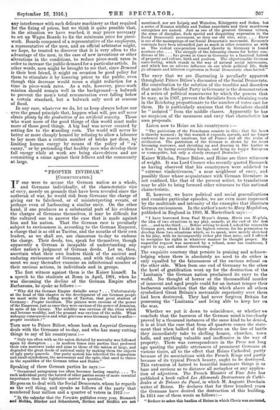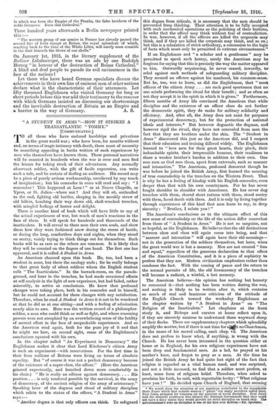T one were to accuse the German nation as a
whole, and Germans individually, of the characteristic vice of envy, merely on grounds that have been revealed since the outbreak of war, he would risk from Germans the charge of giving ear to falsehood, or of misinterpreting events, or perhaps even of harbouring a similar envy. On the other hand, if one produces as a substantial part of his evidence the charges of Germans themselves, it may be difficult for the cultured one to answer the case that is made against him and his nation. That the German race is peculiarly subject to enviousness is, according to the German Emperor, a charge that is as old as Tacitus, and the mouths of their own leaders, as we shall see, are clamorous to-day to endorse the charge. Their deeds, too, speak for themselves, though apparently a German is incapable of understanding any other nation's judgment of German deeds. Let us, then, ascertain what their own leaders think of the ancient and enduring enviousness of Germans, and with that enlighten- ment we may thereafter examine an infinitesimal number of their envious actions, in individuals and in groups.
The first witness against them is the Kaiser himself. In a speech to the students at Bonn in April, 1901, when he was discussing the decline of the German Empire after Barbarossa, he spoke as follows :- " Why did the German Empire dwindle away f . . . Unfortunately at the head of this chapter in the development of our German people we must write the telling words of Tacitus, that great student of Germany : Props,. invidiam. The princes were envious of the power of the Emperott, just as once they were envious of the power of Arminius, In spite of his victory. The nobility was envious of the cities which tad become wealthy, and the peasant was envious of the noble. What unhappy. consequences and what grievous woes Germany had to suffer- propfrr snvidiam " Turn now to Prince Billow, whose book on Imperial Germany deals with the Germans of to-day, and who has many cutting things to say of his countrymen :- "Only too often with us the union dictated by necessity was followed again by disruption . . . in modem times into parties that preferred their own narrower tasks and aims to those of the nation at large, and degraded the great deeds of national unity by making them the objects of ugly party quarrels. Our party system has inherited the dogmatism and small-mindedness, the moroseness and the spite, that used to thrive in the squabbles of the. German tribes and States."
Speaking of these German parties he says :- "Occasional antagonism too often becomes lasting enmity. . . . To each individual party the hatred of other parties seems of more essential importance than the legislative matter in question." He goes on to deal with the Social Democrats, whom he regards as the- evil thing, and speaks as follows of the party that numbered' four million and a quarter of voters in 1912 :- " In the calendar that the Vorwarts publishes every year, Bismarck and Rola.% Bliicher and Scharnhorst. Methen and Seidlitz are not mentioned, nor are Leipsig and Waterloo, Koniggratz and Sedan, but a series of Russian nihilists and Italian anarchists and their murderous enterprises are named. Just as one of the greatest German virtues, the sense of discipline, finds special and disquieting expression in the Social Democratic movement, so does our old vice, envy. . . . Envy is one of the mainsprings of our Social Democratic movement. Economic contrasts have been intensified just as much in other countries as witk us. The violent exasperation roused thereby in Germany is found nowhere else. . . . The struggle of the labouring classes for 'better con- ditions of life . . . has grown at times in Germany to a fanatical hatred of property and culture, birth and position. The objectionable German caste-feeling, which stands in the way of natural social intercourse. and which has an adverse influence on our whole political life, finds its ultimate and bitterest expression in Social Democratic class-hatred."
The envy that we are illustrating is peculiarly apparent throughout Prince Billow's discussion of the Social Democrats. His contribution to the solution of the troubles and disorders that unite the Socialist Party in Germany is the demonstration of a series of political manoeuvres by which the powers that be may, as in 1907, prevent the Socialists from obtaining seats in the Reichstag proportionate to the number of votes cast for them. He is particularly anxious that the Socialists should , be " isolated ' from the middle classes. Apparently he has no suspicion of the meanness and envy that characterize his own proposals.
Listen now to Heine on his countrymen :- " The patriotism of the Frenchman consists in this : that his heart is thereby warmed ; by this warmth it expands, spreads, and no longer embraces his nearest emotions, but all France and all the realm of civilization. The patriotism of the German is shown by his heart becoming narrower, and shrinking up and drawing in like leather in a frost ; by hating everything foreign, and being no longer European or cosmopolite, but only a closely cramped Deutacher."
Kaiser Wilhelm, Prince Billow, and Heine are three witnesses of weight. It was Lord Cromer who recently quoted Bismarck as having observed that his countrymen were addicted to " extreme vindictiveness," a near neighbour of envy, and possibly those whose acquaintance with German literature is not confined, like that of the present writer, to translations may be able to bring forward other witnesses to this national characteristic.
If, however, we leave political and social generalizations and consider particular episodes, we are even more impressed by the multitude and intensity of the examples that illustrate German enviousness. In the author's note to Mary Magdalene, published in England in 1910, M. Maeterlinck says:— "I have borrowed from Paul Heyse's drama, Maria von Meg tales. the idea of two situations in my play, namely, at the end of the first act ... and in the third.... Before setting to work I asked the venerable German poet, whom I hold in the highest esteem, for his permission to develop these two situations which, so to speak, were merely sketched in his play, with its incomparably richer plot than mine, and I offered to recognize his rights in whatever manner he thought proper. My respectful request was answered by a refusal, none too courteous, I regret to say, and almost threatening."
The exquisite courtesy that persists in praising and acknow- ledging where there is absolutely no need to do either is only equalled by the fatuousness of the envious refusal on the other side. When from one end of Germany to the other the howl of gratification went up for the destruction of the Lusitania ' the German nation proclaimed its envy to the world. No thought of horror at the thousandfold murder of innocent and aged people could for an instant temper their barbarous satisfaction that the ship which above all others symbolized Great Britain's mercantile superiority over them had been destroyed. They had never forgiven Britain for possessing the Lusitania ' and being able to keep her on the seas.
Whether we put it down to coincidence, or whether we conclude that the baseness of the German mind is too clearly proved by a thousand instances of the same kind to be denied, it is at least the case that from all quarters comes the state- ment that when balked of their desires on the line of battle they immediately take to shelling houses, churches, town halls, and anything valuable and inoffensive in the way of property. There was correspondence in the Press not long ago quoting the public utterances of prominent Germans at various times, all to the effect that Reims Cathedral, partly because of its associations with the French Kings and partly because of its typical French beauty, ought to be destroyed. This extension of hatred to beautiful inanimate things is so base and envious as to distance all metaphor or any applica- tion of adjectives. The French Minister of Fine Arts has published a book called Les Allemands Destructeurs de Cathe- drales et de Tresors du Passe, in which M. Auguste Dorchain writes of Reims. He declares that for three hundred years the Germans have desired the destruction of this building. In 1614 one of them wrote as follows :— " Reduce to ashes this basilica of Bann in which Clovis was anointed.
in which was born the Empire of the Franks, the false brethren of the noble Germans. Burn this Cathedral."
Three hundred years afterwards a Berlin newspaper printed this .- " The western group of our armies in France has already passed the second lino of forts except at Reims, the royal splendour of which, reaching back to the time of the White Lilies, will surely soon crumble in the dust beneath the blows of our shells."
On January 1st, 1915, in the literary supplement of the Berliner Lokalanzeiger, there was an ode by one Rudolph Herzog "in honour of the destruction of Reims Cathedral." A blind and deaf people to parade its evil enviousness in the face of the nations I Let those who have heard German specialists discuss the achievements in their own line of eminent men of other nations declare what is the characteristic of their utterances. Let fifty thousand Englishmen who visited Germany for long or short periods before this war add their testimony to the rancour with which Germans insisted on discussing our shortcomings and the inevitable destruction of Britain as an Empire and































 Previous page
Previous page